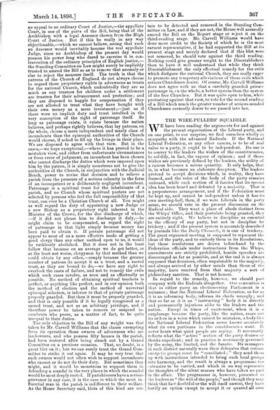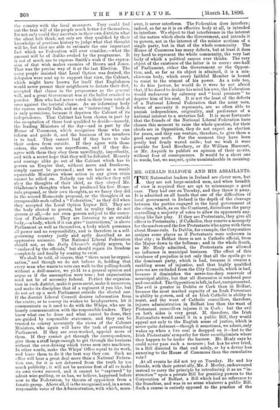THE W1RE-PULLERS' SQUABBLE.
WE have been reading the arguments for and against the present organisation of the Liberal party, and on one point, to our surprise, we find ourselves wholly in sympathy with the advanced Radicals. If the National Liberal Federation, or any other caucus, is to be of real value to a party, it ought to be independent. Its use is to convey to the leaders the wishes of the constituencies, to solidify, in fact, the vapour of opinion ; and if those wishes are previously defined by the leaders, the utility of a caucus becomes a minus quantity. It only helps, that is, in what becomes an elaborate deception. The leaders pretend to accept decisions which, in reality, they have framed, and the voice of the body of the party remains unheard, while each section of it fancies that its special idea has been heard and defeated by a majority. That is a preposterous arrangement., and if the Federation must be kept up, and cannot be independent unless it has its own meeting-hall, then, if we were Liberals in the party sense, we should vote in the present discussion on the Radical side. They want a. place of abode distinct from the Whips' Office, and their postulate being granted, they are entirely right. We believe in discipline as essential to the efficacy of any party, but not in discipline by trickery ; and if the present system is accurately described by journals like the Daily Chronicle, it is one of trickery. The great organised meeting is supposed to represent the ideas of the party, and to embody them in its Resolutions, but those resolutions are drawn beforehand by the Federation officials under instructions from the Whips, amendments are strictly prohibited, hostile speeches are discouraged as far as possible, and at the end it, is always supposed that decisions, often unpalatable to the majority, and always arrived at by other minds than those of the majority, have received from that majority a sort of plebiscitary sanction. That is not honest.
In regard to the remedy, however, we should part company with the Radicals altogether. Our contention is that in either party an electioneering Parliament is a nuisance ; that the National Liberal Federation, so far as it is an informing body, informs its chiefs wrongly ; and that so far as it is an "instructing " body it is directly and permanently injurious alike to the leaders and the nation. Except in times of excitement, when it is a surplusage because the party, like the nation, roars out its orders in a voice which cannot be mistaken, a body like the National Liberal Federation never knows accurately what its own partisans in the constittienci( s want,. It never hears what quiet people are saying. It necessarily reflects what the " active " section of the party desires or thinks expedient; and in practice is necessarily governed by the noisy, the limited, and the fanatic. Its managers in each district naturally warn their delegates that certain energetic groups must be "conciliated ; " they send them up with instructions intended to bring such local groups into harmony, and the result is always a programme too extensive to be carried, and which in no way represents the thoughts of the silent masses who have taken no part in the affair. The programme is, however, presented to the leaders as" the will of the people," and though they may think that fact doubtful or the will itself unwise, they have hardly an option except to accept it or quarrel all over the country with the local managers. They could find out the true will of the people much better for themselves, for not only could they ascertain in their own districts what the silent folk think, not only are they qualified by their knowledge of previous history to judge what that thought will be, but they are able to estimate the one important fact which no Federation will ever consider,—what the amount will be of dislike evoked by the programme. It is not of much use to express Smith's wish if the expres- sion of that wish makes enemies of Brown and Jones. That was the precise way of it at the last Election. The noisy people insisted that Local Option was desired, the delegates were sent up to support that view, the Cabinet, which might have known for itself that Englishmen would never permit their neighbours to dictate their diet, accepted that clause in the programme as the g..neral will, and a great Government was at the ballot crushed to powder. Men who had never voted in their lives voted at once against the teetotal clause. As an informing body the caucus usually fails, and as an " instructing " body it is only pernicious, because it deprives the Cabinet of its independence. That Cabinet has been chosen in part by the co-optation of those best qualified to decide—namely, the leading Ministers of the day—and in part by the House of Commons, which recognises those who can inform and guide it, and the business of its members is to lead. They cannot lead if they have to take their orders from outside. If they agree with those orders, the orders are superfluous, and if they dis- agree with them they obey them unwillingly, imperfectly, and with a secret hope that they will be defeated. Honesty and courage alike go out of the Cabinet which has to govern an Empire that, without nerve and frankness, simply cannot be governed ; and we have as a result squeezable Ministries whose action in any given crisis cannot be relied on. Nobody can tell whether they will obey the thoughts of their chief, as they obeyed Mr. Gladstone's thoughts when he produced his first Home- rule proposal, or their own thoughts, as we fancy they did in the second Home-rule proposal, or the thoughts of an irresponsible mob called a "Federation," as they did when they accepted the Local Option Liquor Bill. They are the body elected to govern, but in reality they do not govern at all,—do not even govern subject to the correc- tion of Parliament. They are listening to an outside body,—a body, which if it can give" instructions," is above Parliament as well as themselves, a body which possesses all power and no responsibility, and is therefore in a self- governing country justly and aptly described as an oppressive nuisance. The National Liberal Federation should not, as the Daily Chronicle rightly argues, be "enslaved by the officials," but should regain its freedom completely and finally by ceasing to exist.
We shall be told, of course, that "there must be organi- sation," and though we do not believe it, holding that every man who wants to vote can walk to the polling-booth without a drill-master, we yield to a general opinion and argue as if the assumption were true ; but organisation need not be of necessity federal. Perfect the organisa- tion in each district, make it permanent, make it numerous, and make its discipline that of a regiment if you like, but do not set up a mob Parliament outside the elected one. If the district Liberal Council desires information from the centre, or to convey its wishes to headquarters, let it communicate as it used to do with the Whips, who are in hourly communication with the responsible leaders. They know what can be done and what cannot be done, they are guided by responsible statesmen, and they can be trusted to convey accurately the views of the Cabinet Ministers, who again will have the task of persuading Parliament. If they are over-worked, appoint more of them. If they cannot get through the correspondence, give them a staff large enough to get through the business without the over-driving which turns men into machines.
In other words, make the Whips' Office equal to its work, and leave them to do it the best way they can. Such an office will hear a great deal more than a National Federa- tion can, for it is not debarred from the truth by too much publicity ; it will not be anxious first of all to make its own views succeed, and it cannot be "captured" by adroit wire-pulling, or as has, we believe, happened before now to the Federation, by threats of opposition from a fanatic group. Above all, it is the recognised and, in a sense, responsible voice of the Administration, with which, more- over, it never interferes. The Federation does interfere ; indeed, so far as it is an effective body at all, is intended to interfere. We object to that interference in the interest of the nation which elects the Government, and intends it to govern, not in the interest of the noisier sections of a single party, but in that of the whole community. The House of Commons has many defects, but at least it does try hard to represent the whole community, the very last body of which a political caucus ever thinks. The very object of the existence of the latter is to coerc3 one-half of Parliament, either the Government or the Opposi- tion, and, so far as its object is attained, it is a mis- chievous body, which every faithful Member is bound to resist to the utmost of his power. As a rule too, to do him justice, he would do it were he not afraid that, if he dared to declare his mind his own, the Federation would endeavour by calumny and "local pressure" to deprive him of his seat. It is not the least of the defects of a National Liberal Federation that the noisy men, whom of necessity it represents, are so often able to punish independence, originality, and preference of a national interest to a sectarian fad. It is most fortunate that the friends of the National Liberal Federation have chosen this moment to raise the whole question, for their chiefs are in Opposition, they do not expect an election for years, and they can venture, therefore, to give them a good savage snub. For the moment they have been gently but firmly waved aside; but we wish it were possible for Lord Rosebery, or Sir William Harcourt, or Mr. Asquith to publish an opinion of their Inc:rite, without fear of consequences. It would be a short one in words, but, we suspect, quite unmistakeable in meaning.







































 Previous page
Previous page